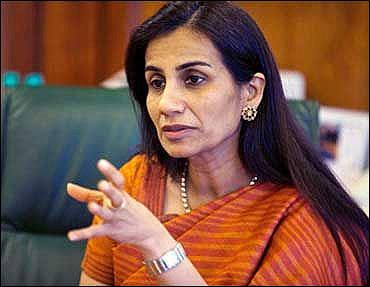 | « Back to article | Print this article |
Chanda Kochhar: It's fashionable to change jobs every 3 years
Chanda Kochhar, MD and CEO of ICICI Bank talks about the education system in India and offers advise on how parents can help in the decision making process of a child's career.
As the Managing Director and Chief Executive Officer of ICICI Bank, Chanda Kochhar needs no introduction.
Her views on education, choosing a career and growing in it, and India's job market vis-a-vis the modern economy are something that not many people are familiar with.
She spoke to Maheshwar Peri in a candid tete-a-tete
Tell us something about your childhood.
I come from a very education-oriented family.
My father was the principal of Malaviya Regional Engineering College at Jaipur, it is now called Malaviya National Institute of Technology.
I think the basic thing in him was that children must be able to get good education whatever be their circumstances. The choice of career was up to us but whatever we would decide to do we should do well in that. I was still in school in Jaipur when my father expired, leaving behind my mother and three children.
That's when my mother decided to shift to Bombay, where I would complete the rest of my education.
What made you study cost accountancy at Institute of Cost and Works Accountants of India (ICWAI)?
I had planned to do an MBA after finishing graduation.
While I was doing my graduation I realised I had too much time at hand.
So instead of hanging around in college I thought I should do cost accountancy. That's how I came to enroll at ICWAI.
You did acquire an MBA afterwards. Right?
Yes, as I had planned.
'I believe our basic education is actually very good'
How did ICICI happen?
That time campus recruitments did not happen, but they would call toppers of a few institutes; so I went for the interview to ICICI and it just happened.
What's your view on Indian education?
I believe our basic education, up to the 10th or 12th classes, is actually very good with teachers being well trained and children working hard. The issue is: do we have enough schooling capacity to meet the requirement?
And when we find the capacity in government schools, are we really providing good education?
Are teachers coming to schools? Is it quality education?
Another issue has to do with the gap in vocational education.
We keep talking of India's demographic dividend and the 12 million people who start looking for jobs every year.
They need to be trained and made productive. They have little chance of landing a job if there is no demand for their current level of skills and education. Unless we are ready with provision of a wide range of skills, there is going to be waste of human resources.
Today everyone seems to be getting into vocational training. A lot of the institutes are just there for money. Is there any standardisation and regulation that you recommend?
Yes, standardisation and regulation and also focus on different fields. I mean in the field of finance, banking is different and insurance is different. There are so many new vocations. It's not only just engineers and doctors.
Does ICICI have any code for recruiting when you go to a campus or choose a campus?
We do some analysis of the institution. In looking for people, we look for attributes that we have internally identified in addition to knowledge.
What are those attributes?
Like whether a person can work in a team. Do they have a passion to perform?
While assigning jobs, we do another analysis to decide whether their attributes would make them fit in Sales or Customer Relations and so on.
'It's the overall personality that decides an individual's success'
How do you view the tough competition in academics which leaves very little in terms of extra-curricular activities?
I do consider other attributes as very important. It's the overall personality that decides an individual's success or how he or she performs in a job.
Personality determines the way you apply your knowledge and are able to handle different situations. We can't give marks to a person. Anyway there is no tracking of that, but, as I said, we do look for attributes like the passion to perform.
What's your take on education within India in comparison to foreign education?
As I said earlier, our basic education is stronger than what you see in many other countries.
It's a great foundation for the children. After 12th class, however, while we are very strong in certain fields, I think we have not yet been able to develop the diversity that the economy requires.
There are some countries that give students the flexibility and diversity to be able to choose the field they would like to specialise in.
The second advantage of foreign education is that meeting people across different cultures, geographies helps you widen your perspective.
'Children always look at the green side of careers'
How involved are you in your children's planning for their careers and what advice would you give a parent?
Some amount of parental involvement is required but not to the point of compelling a child to do something that he or she dislikes.
That involvement could come through reasoning with the children and helping them make sound decisions. Asking questions like: How do you look at an option? How do you analyse an option? What good or bad do you foresee in each option? Since children always look at the green side of careers, they can do with a lot of more information to make the right decision.
Today's youngsters are often advised that changing a job every three years will take them to the top. You have stuck with a single employer for 25 years. Would you tell the youngsters that if they stick around, they may grow faster?
Yeah! I think there is huge advantage in sticking around because you then become an inherent part of the organisation.
You know more on how the organisation functions. It seems to have become a fashion to change jobs every three years on the ground that "I need to test my market value".
We also kept getting offers all the time that told us our market value, but we still attached a value to cultivating a team. So I think there is a difference in the approach.
The youth are also being advised that achieving success is important; how you achieve that is not. What is your opinion? At ICICI, do you take decisions that are right but are commercially bad?
There are a lot of times when you take a decision for ethical governance, for regulatory compliance and so on and it may hurt your commercial objective and lead to a loss of a business opportunity.
We might have never launched a product if we thought it was not compliant with regulations such as KYC (know-your-customer) rules or AML (anti-money laundering) processes.
The issue is: should you push the envelope and try to do the business loosely or you say, 'No! We think this is the rule of the game that we must play by'.
Will we ever see a talent scholarship being set up for students?
I have been telling my team to do that, but we are still unsure how to go about it. How do we make sure, for instance, that the whole country has been covered? We'd like to do it well if we do get around to doing it. That's why probably it has not been done so far.



